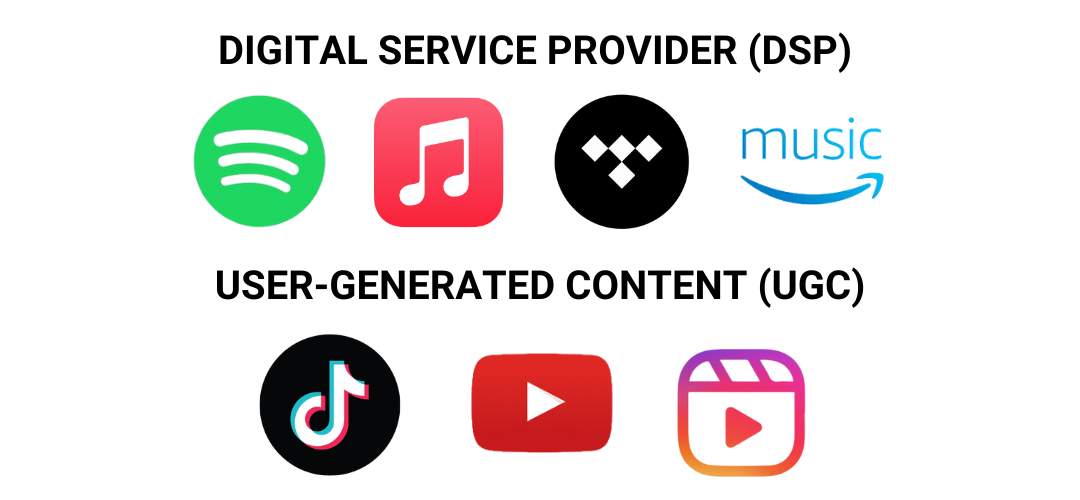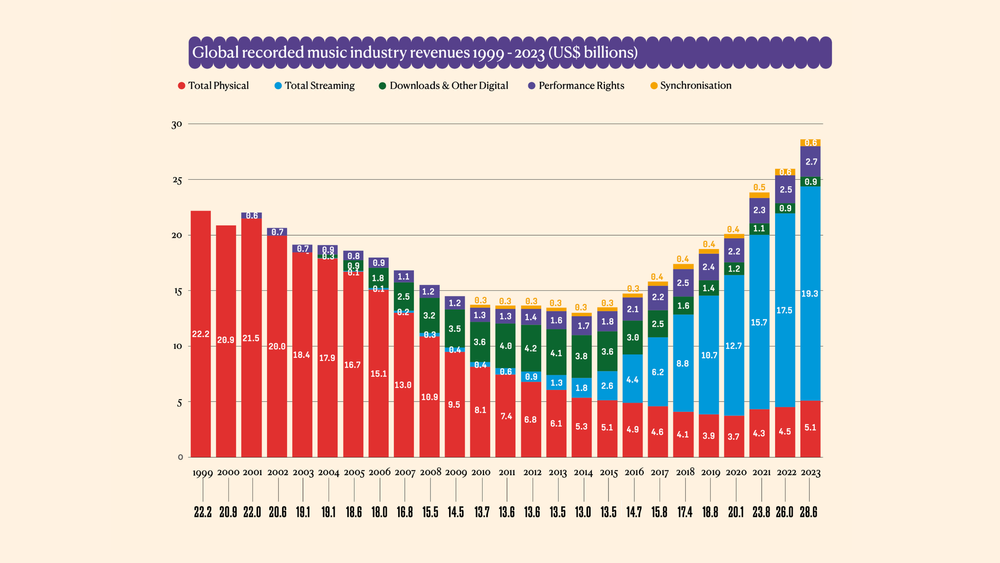Streaming Campaign: Burst their Bubble
While musicians struggle to make a dime, big streaming services are getting bloated on record profits. It’s time to burst their bubble. The rise of on-demand streaming services has transformed the music industry, providing listeners with unprecedented access to vast musical libraries. However, this shift has adversely impacted the artists who create the music. Despite the substantial revenues these platforms generate, many performers receive minimal financial compensation for their streamed works. If we want the artists we love to keep producing great music, we need to raise our voices. This disparity highlights a systemic issue where the contributions of artists are undervalued.
At ACTRA RACS, we are committed to addressing this imbalance and advocating for a fairer system in Canada that ensures artists receive equitable remuneration for their creations. We invite you to join the conversation and support reforms that recognize and reward the vital role artists play in enriching our musical landscape.
What the Streaming Boom Means for Artists
The music industry has undergone a significant transformation in how we consume music, shifting from physical formats like CDs and vinyl, and traditional broadcast mediums like radio, to predominantly on-demand digital streaming platforms (DSP) such as Spotify, Apple, and YouTube. In 2024, global music streaming services like Spotify and Apple Music are projected to generate nearly $30 billion (USD) in revenue, with user-generated content (UGC) platforms like YouTube and TikTok increasing that total further.1 By 2027, Canada alone is expected to see its number of streaming users rise to 9.9 million, with a corresponding increase in revenues.2

Despite this massive financial growth, the digital streaming era has left many performers with almost no financial benefit from the exploitation of their work. Many artists, particularly session musicians (i.e. non-featured performers), receive only modest upfront payments, but collect no royalties from streams, no matter how popular the recording is.
Ironically, it’s these same performers who create the music that attracts fans to streaming platforms, driving billions of dollars in subscriber fees and advertising revenue. Meanwhile, streaming services have expanded into lucrative new ventures, such as audiobooks and podcasts, leveraging the success of music to build broader offerings.3 Yet artists—whose work is the foundation of this entire ecosystem—haven’t seen any corresponding increase in compensation. Instead, streaming platforms continue to reap massive profits and boast sky-high stock valuations.4

Study after study shows that streaming services are underpaying performers for the use of their work leaving Canadian recording artists, musicians, and vocalists with a low standard of living, as their mean incomes land in the $20–30k CAD range.5, 6 But the COVID-19 pandemic exposed the precarious financial realities faced by countless artists, with declining radio listenership and ad revenues, alongside an increased reliance on streaming and its unfair compensation system.7 This underscores just how unsustainable the current model is for those who create the content driving streaming platforms’ success. This disparity is not just an economic issue—it’s a question of fairness and sustainability. How can streaming services justify amassing record-breaking profits while the music creators struggle to make ends meet? If this inequity continues unchecked, we risk losing the diversity and creativity that makes music such a rich part of our lives. Streaming platforms have the resources and responsibility to do better. It’s time they recognize the true value of the artists who make their success possible.
The Recording Industry Leaves Artists Behind
The recording industry is making profits that haven’t been seen since before the Napster era. In 2023, the global music industry experienced its ninth consecutive year of growth, with streaming revenues comprising 64% of the total.8 In Canada, streaming generated over $500 million (USD).9
Despite this financial upturn, artists have not seen proportional benefits. Many performers are excluded from record label remuneration models, while others are bound by outdated contracts that yield minimal, if any, payments. These contracts often include recoupable expenses, excessive service costs, and a lack of transparency, failing to account for modern technologies.10
The music industry presents a complex landscape for performers. While treatment can vary, many encounter predatory and exploitative practices. One major issue is that performers often cannot negotiate directly with streaming services because their rights have been systematically transferred to record labels. This transfer limits performers’ control over their work and their ability to obtain equitable compensation.
Addressing this imbalance requires industry-wide reforms to empower performers and ensure they receive fair remuneration in the evolving digital landscape.
Protecting Cultural Heritage with Fair Artist Payment
Fair compensation revalues, dignifies, and empowers artists within society. This principle is codified in Article 27 of the United Nations Universal Declaration of Human Rights, which states:
“Everyone has the right to the protection of the moral and material interests
resulting from any scientific, literary, or artistic production of which he is the author.” 11
In Canada, millions of performances are streamed annually, showcasing a rich tapestry of genres that reflect the nation’s cultural diversity. However, the current compensation system excludes many artists, particularly those from genres that, despite being successful on streaming platforms, remain underrepresented in other formats. This exclusion prevents them from receiving appropriate payment for their work. Implementing a more equitable payment structure would extend the advantages of modern technology to these artists, ensuring that all contributors receive fair remuneration.
Exploiting artists’ work without proper compensation demoralizes them and hinders their ability to continue creating. Ensuring fair payment is essential for fostering a vibrant and inclusive cultural landscape, allowing Canadian stories and identities to flourish and shared.
Canada lags other countries around the world in establishing clear rights for performers in the on-demand and user-generated content world. To ensure fair compensation, Canada must adopt similar measures to those seen globally, where performers’ rights are clearly defined and protected.
International Solutions for Modern Performer Rights
Looking around the world, we’re seeing new and unique rights become established specifically for performers in this new reality, setting them up for a better future. Countries like Spain, Belgium, Portugal, Hungary, and Serbia have adopted laws to ensure that performers receive fair compensation for this type of use.12 Other countries, like Uruguay and Germany have begun exploring similar models. These changes have only had a positive impact on the music industry. For example, in Spain, performers can negotiate fair payment directly with streaming services, resulting in a percentage of the service’s gross revenues going directly to performers, via their CMO, while record labels continue to function as normal. Similarly, there have been limited operational impacts on the streaming services.13
Canada must adopt similar measures to those emerging globally—clear rights for performers in the on-demand and user-generated content streaming world.
Artists deserve a fair share of the revenue generated by their work. At ACTRA RACS, we are committed to advocating for a new financial model—one that draws inspiration from global successes and ensures Canadian performers receive appropriate compensation from streaming services. The music industry cannot thrive without its performers, and only by holding streaming services accountable can we achieve fair compensation for their invaluable contributions.

ACTRA RACS’ Proposal for Fair Streaming Compensation
In addition, this model can support the preservation and dissemination of rich musical heritage. Traditional music genres, such as Spain’s flamenco, have the chance to benefit from remuneration models paying artists. This model can ensure that performers whose music is culturally significant receive fair compensation.
We propose amending the Copyright Act to grant all performers on recordings—including non-featured performers—a clear and enforceable right to receive payment when their performances are streamed or made available online. As seen in other territories, collective management organizations (CMOs) are best equipped to administer these rights on behalf of performers, ensuring efficiency, fairness, and accountability.
The current rights structure is outdated and disproportionately benefits those who exploit artists economically. These examples show us what is possible when systems are built to support performers. Rights must be modernized in the streaming era to ensure artists are fairly compensated, regardless of changes in technology and listener habits.
Head to https://bursttheirbubble.ca/ to see how you can help!
CITATIONS
- https://www.statista.com/forecasts/945879/digital-music-arpu-in-the-world-forecast
- https://www.statista.com/outlook/dmo/digital-media/digital-music/music-streaming/canada
- https://www.rd.com/article/free-audiobooks-on-spotify/
https://www.spotify.com/us/audiobooks/ - https://www.macrotrends.net/stocks/charts/SPOT/spotify-technology/stock-price-history
https://stockanalysis.com/stocks/googl/market-cap/
https://stockanalysis.com/stocks/aapl/
https://stockanalysis.com/stocks/spot/financials/ - https://www.wipo.int/edocs/mdocs/copyright/en/sccr_41/sccr_41_3.pdf
https://www.fairtrademusicinternational.org/wp-content/uploads/2015/05/fair-trade-music-international-equitable-remuneration-study.pdf
https://ukparliament.shorthandstories.com/music-streaming-must-modernise-DCMS-report/index.html - https://www.jobbank.gc.ca/marketreport/wages-occupation/7971/ca
- https://radiotoday.co.uk/2024/04/the-impact-of-music-streaming-services-on-radio-audiences/
- https://globalmusicreport.ifpi.org/
- https://musiccanada.com/news/ifpi-releases-global-music-report-2024-highlighting-growth-in-subscription-streaming-globally/
- https://www.researchgate.net/publication/384432774_Record_Contracts_Recording_Artists_Work_and_Exploitation
https://www.vice.com/en/article/bad-deals-are-baked-into-the-way-the-music-industry-operates - https://www.ohchr.org/sites/default/files/UDHR/Documents/UDHR_Translations/eng.pdf
- https://www.aie.es/en/aie/about/
https://www.pravainterpretatora.org/en-gb.html
https://www.iaomusic.org/artists-welcome-the-remuneration-right-for-streaming-adopted-in-belgium/ - https://committees.parliament.uk/oralevidence/1747/pdf/
